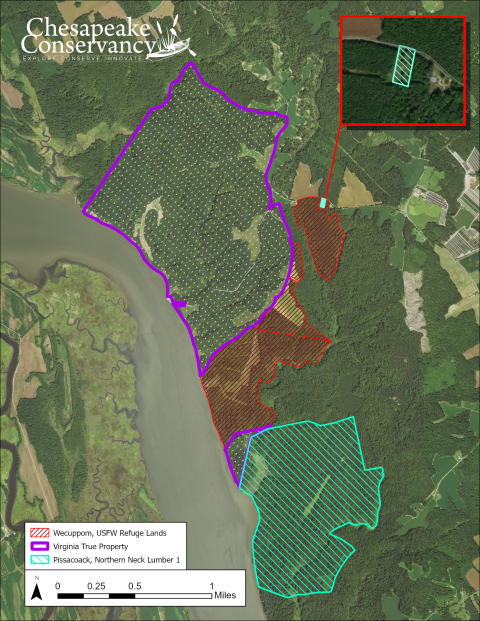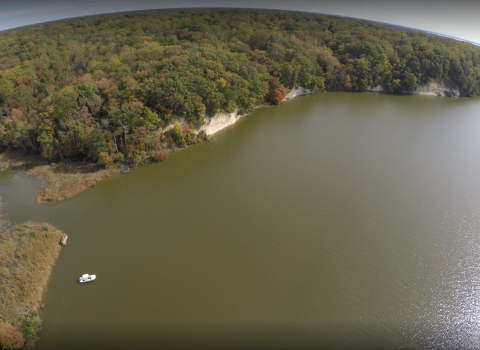On December 8, The Conservation Fund purchased 964 acres of Fones Cliffs, along the Rappahannock River, with intentions of returning it to the Rappahannock Tribe. Once re-acquired, this land, originally the Tribal village of Wecuppom, will more than double the Tribe’s holdings.
This remarkable achievement follows the Tribe’s re-acquisition of the village of Pissacoak, 465 acres of their ancestral homelands at Fones Cliffs in April 2022. Through the generosity of the family of William Dodge Angle, M.D., and with support from the National Fish and Wildlife Foundation and a grant from Walmart’s Acres for America Program, Chesapeake Conservancy purchased the land and donated ownership to the Rappahannock Tribe. The Conservancy also donated a conservation easement conservation easement
A conservation easement is a voluntary legal agreement between a landowner and a government agency or qualified conservation organization that restricts the type and amount of development that may take place on a property in the future. Conservation easements aim to protect habitat for birds, fish and other wildlife by limiting residential, industrial or commercial development. Contracts may prohibit alteration of the natural topography, conversion of native grassland to cropland, drainage of wetland and establishment of game farms. Easement land remains in private ownership.
Learn more about conservation easement to the U.S. Fish and Wildlife Service to ensure these lands were protected for years to come.
That incredible, collaborative, conservation success was tinged with a sense of urgency, as the remaining ancestral lands at Fones Cliffs were still under threat of development. The Virginia True Corporation planned to build an exclusive resort and suburban neighborhood on the property. However, unpermitted land clearing sparked a series of lawsuits that rendered the corporation bankrupt.
The Tribe and its collaborative partners breathed a sigh of relief (then a cry for joy) when The Conservation Fund, a national nonprofit land trust, secured the property through bankrupcy proceedings. The Fund intends to transfer the land to the Rappahannock Tribe in late 2023. In the coming months, the Service will purchase a conservation easement on the land using funding from the Land and Water Conservation Fund.
The LWCF was created in 1964. In 2020, it was permanently financed with an annual appropriation of $900 million by the Great American Outdoors Act Great American Outdoors Act
This landmark conservation law, enacted in 2020, authorizes the use of up to $1.9 billion a year in energy development revenues for five years for needed maintenance to facilities and infrastructure in our wildlife refuges, national parks, forests, recreation areas and American Indian schools.
Learn more about Great American Outdoors Act . This program works collaboratively with federal, state, and local agencies to protect the nation’s public lands and natural and cultural resources.
“With the help of The Conservation Fund and other partners, this transaction is of upmost importance for the Rappahannocks to be able to return to the lands of our ancestors,” said Chief Anne Richardson of the Rappahannock Tribe. “It’s incredibly healing for our Tribe today and to know that it will be preserved perpetually for future generations ensures stability in the hearts of our elders for tomorrow.”
Not only is this location culturally significant, but Fones Cliffs is a global Important Bird Area for resident and migratory birds. This essential habitat is the sheltering site for the mid-Atlantic's largest population of bald eagles. Additionally, neighboring wetlands, as well as large marshes across the river, are of crucial import to rare and threatened plant life and several protected species of fish and waterfowl.
The Service will work closely with The Conservation Fund and the Rappahannock Tribe to monitor and protect the property during the Fund’s interim ownership.
“This is a true milestone in a long-hoped-for conservation effort,” said Marcie Kapsch, project leader of the Eastern Virginia Rivers National Wildlife Refuge Complex. “The Conservation Fund’s commitment to the cultural and historic resources of Fones Cliffs will allow ever-greater collaborative conservation between Rappahannock River Valley National Wildlife Refuge and the Rappahannock Tribe.”






